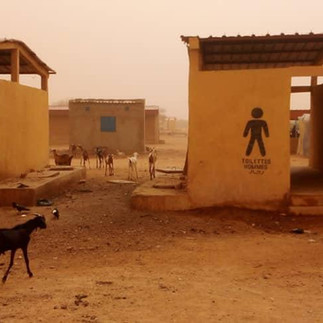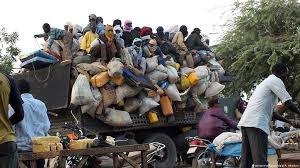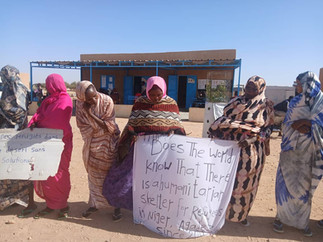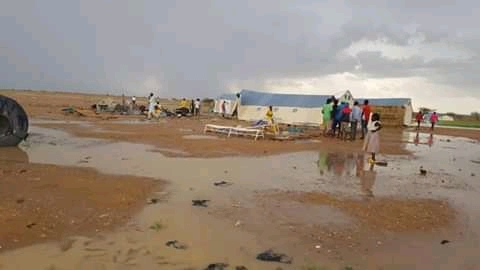Is the humanitarian shelter in Agadez, Niger, humanitarian? Refugees stuck there for 7 years asks & writes a letter to the UNHCR & the international communities.
- Refugees in Libya

- Nov 23, 2024
- 10 min read

Our past is sad, our present is bad, and our future is unknown, so we don’t want to stay here!!
This powerful slogan, held aloft during ongoing protests at the Agadez Humanitarian Center in Niger, captures the despair of the thousands stranded in this so-called “humanitarian” shelter. For over seven years, these refugees—primarily fleeing Sudan’s ongoing violence—have endured neglect, lack of protection, and fear. As they demand their basic rights through peaceful demonstrations, their plight is largely ignored by UNHCR, Nigerien government and the global community
Far from being a sanctuary, the Agadez center has devolved into what many describe as an open-air prison, a containment zone. Refugees fleeing genocide, civil war, and persecution in countries like Sudan, Chad, and Eritrea find themselves stranded in this desolate location with no clear future.
With no end in sight to their suffering, the refugees penned a heartfelt letter to the UNHCR and the international community, pleading for attention and action.

A Desperate Letter to the World
With no end in sight to their suffering, on November 22, 2024, the refugees penned an open letter to the UNHCR and the international community. Their plea is as heartbreaking as it is urgent:
"To the UNHCR and humanitarian organizations. To the concerned parties with human rights,
We are the refugees in the humanitarian Center in Agadez inside the state of Niger, we are addressing you today from the depths of pain and suffering that have extended for many years. For more than seven years, we have been living in this humanitarian Center , where we face a harsh and unbearable environment in the absence of the most basic elements of a decent life. In each season of the year, the conditions change, but the pain and suffering remain the same.
Women, children, and patients live without hope. There is no sufficient treatment for patients who suffer in silence, no education for children who have lost their childhood in the tents, and women who struggle to maintain their families in the absence of security and care.
We are refugees, we fled our countries due to threat and forced displacement and came to Niger to seek safety and security, but in these days we are threatened by CNE officials because of the peaceful protest in which we demand our rights as refugees. Now we are afraid and terrified, so we do not want to stay here and we can not return to our country that is witnessing devastating wars that make returning to it impossible. We fled to Libya in search of safety, but we found ourselves trapped in a more severe situation. We entered its dark prisons and were subjected to the most heinous types of psychological and physical torture.
As the suffering worsened, we came to Niger in search of security and to live in a suitable humane environment, but we found the opposite in Niger. We lived for seven years in a barren and inhumane environment and conditions. It is unfortunate that our country today lives in a spiral of conflicts and disputes that force us to remain in exile. However, life in Agadez Center is no less tragic than the one we fled from. We are stuck between a homeland that cannot be returned to and a humanitarian center that cannot be lived in. The sad thing is that the world sees us but does not hear our Screams , as if we live in the shadows of crises that make headlines, while we are just numbers on waiting lists.
We demand our rights as human beings, our right to treatment, our children's right to education, and our women's right to safety. We ask for nothing more than a decent life that preserves our humanity. Our suffering has been prolonged, and we have begun to feel that the world has forgotten our existence.
We appeal to you to pay attention to our case, to raise our voices to those who can provide assistance. The Agadez Humanitarian Center has become a slow killer, and the situation cannot be postponed. We cannot return to our countries because of the wars, and we cannot stay in this place that robs us of our lives day after day.
So, we, the refugees in Agadez Center , have decided to start demanding our legitimate rights in a peaceful way. This is done through protests inside the humanitarian center and in front of the UNHCR office inside the humanitarian center. It is worth noting that the protests began on Sunday, September 22, 2024, and will continue until our simple demands are met. We do not want to stay here, we deserve to live like every human being.
We hope that , all organizations working in the humanitarian field, and all countries that embrace humanity, will look into our matter, we say it with all weakness and brokenness. We need your urgent support. Do not let us be forgotten, we are human beings, we have the right to a decent life.
With pain and hope, Refugees at the Humanitarian Center in Agadez"

It is evident that the refugees who are stuck in this open air prison labelled as humanitarian shelter have indeed the most terrible and unbearable past from the Darfur genocide to the current Sudanese crisis which started with the ousting of Sudan's former President Omar al-Bashir in the 2019 Sudanese uprising.
Stories from the Shadows
The refugees in Agadez are not faceless victims. They are individuals with harrowing stories of survival, resistance and profound loss.
The Journey of Mo’taz Mokhtar Abkar
Mo’taz Mokhtar Abkar was just 15 when his life was shattered. In 2017, militias stormed his family’s home in Sudan, killing loved ones before his eyes. Fleeing the chaos, Mo’taz escaped to Libya, where his suffering only deepened. Forced to work on a farm under constant abuse and starvation, he faced daily beatings and exploitation.
“I had no money to escape. I had no strength to fight. I was forced to work without food, without rest,” he recounts.
After two years, Mo’taz found work in a car workshop but endured the same brutal conditions, with smoke and toxic fumes damaging his eyesight. Eventually, he escaped with the help of a fellow Sudanese refugee and reached Niger in 2021.
Today, Mo’taz remains trapped in the Agadez Humanitarian Center. “I have lost everything—my parents, my brother, and so many others. I have been here for years, but no one has offered me a solution. I am a refugee, but I feel invisible,” he says. “I do not want to lose my life, too.”
Aboubaker’s Endless Struggle
Aboubaker Al-Siddiq Abkar Yahya’s life has been defined by relentless displacement. From the burning of his hometown in Darfur to the torturous detention camps of Libya, his journey is a testament to human endurance. Despite his degree in economics, Aboubaker’s potential has been squandered by years of confinement in Agadez.
“I came here seeking safety, but I found nothing but suffering,” he explains. His health deteriorates daily, with eye conditions threatening his vision. “If this is what being a refugee means, I don’t know how much longer I can survive.”
Nadia’s Fight for Her Child
For Nadia Ali, safety has always been just out of reach. Pregnant during Sudan’s war, she fled to find medical care, only to face displacement, hunger, and terror. Her newborn child survived the journey to Niger, but Nadia lives in constant fear for her baby’s future.
“I held my child close as bullets flew over our heads,” she recalls. “Now, I look at him and wonder if he will ever know peace.”
The Agadez Humanitarian Center: A Broken Promise
Established in 2017 with funding from the European Union, the Agadez Humanitarian Center was intended as a transit point for refugees awaiting resettlement. Instead, it has become a place where hope goes to die.
Refugees reported the conditions in the camp as follows:
Healthcare: The health clinic operates for only a few hours each day, offering basic care at best. Emergency cases at night often go untreated, with fatal consequences.
Education: Despite promises, there are no schools for the 38% of residents who are children. An entire generation is growing up without knowledge or opportunity.
Living Standards: Overcrowded tents, unsanitary toilets, and limited food supplies make daily life a struggle for survival.
Safety: Refugees report threats and violence from local authorities, with no legal protection.
The EU’s Role in Border Externalization
The European Union played a significant role in externalizing its border management policies, pressuring Niger to adopt stringent anti-smuggling laws, including the controversial Law 2015-36. This law, passed in 2015, was framed as a response to irregular migration but has since exacerbated humanitarian crises and caused severe social and economic harm in Niger.
EU’s Financial Commitment to Niger and Migration Management
The EU allocated substantial funding under its Emergency Trust Fund for Africa (EUTF) to manage migration flows and support Niger’s compliance with migration control measures. As part of these efforts:
1. Total Funding for Migration Management in Niger:
Between 2015 and 2020, the EU provided approximately €1 billion through various programs aimed at curbing irregular migration across the Sahel region, with a significant portion dedicated to Niger.
Niger, as a key transit country for migrants heading to Europe, received €250 million in direct funding for anti-smuggling efforts, local economic development, and the establishment of migrant shelters like the Agadez Humanitarian Center.
2. Specific Allocations under Law 2015-36:
To support the enforcement of Law 2015-36, the EU financed projects targeting the dismantling of smuggling networks, capacity building for Nigerien law enforcement, and the creation of alternative livelihoods for communities previously dependent on the migration economy. These programs included:
€100 million for training and equipping security forces to crack down on smuggling routes.
€50 million for development initiatives aimed at creating “economic alternatives” in regions like Agadez, heavily reliant on the migration industry.
€75 million for improving the conditions in transit camps, such as the Agadez Humanitarian Center, through partnerships with international organizations like UNHCR and IOM.
3. Infrastructure Development and Policing:
Additional EU funds were directed towards infrastructure projects, such as border checkpoints, surveillance technology, and logistical support for Niger’s police forces. These expenditures aimed to deter migration but failed to provide viable alternatives for those affected by the crackdown.
Outcomes and Failures of the Project
Despite the EU’s financial investment, the outcomes of these programs have been deadly.
1. Increased Suffering for Migrants and Refugees:
Migrants were forced to take more dangerous, remote routes through the Sahara Desert, leading to a six-fold increase in deaths between 2015 and 2017. Reports estimate that thousands have perished in these treacherous conditions.
2. Economic Collapse in Agadez:
The migration industry was a significant economic driver in Agadez. The enforcement of Law 2015-36 devastated local livelihoods without providing adequate alternatives, leading to increased poverty and a rise in banditry and organized crime.
3. Unmet Promises of Humanitarian Support:
Projects meant to provide education, healthcare, and job opportunities in areas like Agadez failed to materialize fully, leaving both local populations and refugees in dire conditions.
4. Worsened Conditions in Refugee Camps:
Despite significant EU funding, facilities like the Agadez Humanitarian Center remain severely under-resourced. Refugees report a lack of basic services, with funding often mismanaged or redirected.
5. Dismantling of Traditional Migration Systems:
While the law reduced visible smuggling operations, it forced the migration economy underground, making routes more dangerous and unregulated. Smugglers became more exploitative, and corruption among law enforcement grew.
Dissolution of the Law:
On November 27, 2023, Niger’s military junta repealed Law 2015-36. The repeal came as part of broader efforts by the junta to distance itself from European influence following the EU’s suspension of aid and recognition after the July 2023 coup. The repeal allowed smugglers to operate more openly, which raised concerns from the EU about potential increases in migrant deaths. However, the junta framed the repeal as a rejection of policies that it perceived as prioritizing European interests over local realities.
The Agadez camp is a direct result of European Union policies aimed at curbing migration. By outsourcing border control to countries like Niger, the EU has created de facto detention centers where refugees are warehoused rather than resettled.
While the EU has funneled billions into programs to “manage migration,” these funds have failed to address the root causes of the crisis. Instead, they have created dangerous bottlenecks like Agadez, where refugees are left to languish indefinitely.
The message is clear: intimidation will not silence those who are fighting for their lives and their futures.
Threatening Refugees and silencing their protest:

In the early hours of November 18, 2024, a deliberate act of arson targeted the house of Ahmed Adam, a key figure in the ongoing peaceful protests at the Agadez Humanitarian Center. The attack, which occurred at approximately 3:00 a.m., came after days of escalating threats against Adam and other protest leaders. His residence was set ablaze in what many believe was an attempt to intimidate those advocating for improved conditions and justice within the center.
Ahmed Adam has been at the forefront of the protest. Despite repeated threats from local authorities and camp officials, Adam and his fellow protesters have remained steadfast in their peaceful demonstrations, which began on September 22, 2024.
The arson attack caused significant damage to Adam’s residence. Fortunately, no injuries were reported. However, the incident has intensified fears among the refugee population, particularly those actively involved in the protests. Many refugees view the attack as a deliberate attempt to suppress their voices and derail their efforts for justice.
In the wake of the incident, the protesters issued a collective statement of solidarity:
“We are all Ahmed Adam. This act of violence will not deter us. We remain strong in our fight for justice, dignity, and a better future. For the sake of our goals and our story, we will continue to stand together.”
The situation in Agadez is a humanitarian disaster. These refugees are not asking for luxuries—they are asking for the right to live. Their demands are clear:
1. Immediate humanitarian assistance, access to healthcare and education.
2. Resettlement to countries that can provide safety.
3. Recognition of their basic human rights.
4. Accountability: Ensure oversight of local authorities and humanitarian organizations.
5. Global solidarity: Recognize refugees as human beings, not as statistics or political tools.
The statistics of the camp are as follows:
• Nationalities:
GENDER | AGE AVARAGE | NATIONALITY | ||||||
Male | 1012 | 68,10% | 3 or less yo | 166 | 11,18% | Eritrea | 11 | 0,70% |
Female | 472 | 31,80% | 4 - 12 | 241 | 16,23% | Ethiopia | 13 | 0,80% |
13 - 18 | 158 | 10,64% | CAR | 32 | 2,10% | |||
19 -30 | 561 | 37,80% | Cameroon | 21 | 1,40% | |||
31- 40 | 259 | 17,45% | Chad | 5 | 0,30% | |||
41-50 | 72 | 4,85% | Burundi | 8 | 0,50% | |||
51-60 | 20 | 1,34% | RC | 6 | 0,40% | |||
61-70 | 4 | 0,25% | DRC | 2 | 0,10% | |||
Over 70 | 3 | 0,20% | The Gambia | 1 | <0,1% | |||
Ghana | 1 | <0,1% | ||||||
Guinea | 2 | 0,10% | ||||||
Liberia | 3 | 0,20% | ||||||
Mali | 1 | <0,1% | ||||||
Nigeria | 15 | 1% | ||||||
Sierra Leone | 6 | 0,40% | ||||||
Somalia | 6 | 0,20% | ||||||
South Sudan | 5 | 0,30% | ||||||
Sudan | 1346 | 90,70% | ||||||
Togo | 3 | 0,20% |
These figures illustrate the vulnerable population’s composition, highlighting a significant presence of children, women, and displaced families. The population remains stranded in harsh desert conditions, 20 km away from Agadez, with no proper access to essential services like healthcare, education, and food. Let me know if you’d like to delve deeper into any specific aspects.
Gallery of their protest.


































































Comments